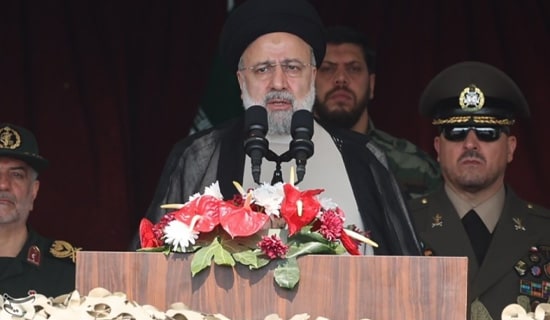The Egyptian government daily Al-Akhbar has continually run an op-ed and editorial offensive against the American administration led by its editor-in-chief Galal Duweidar.
The Axis of Evil - Cheney, Rice, and Rumsfeld
An editorial titled "Seeking to Meet with Bush Is An Insult to the Palestinian Honor" stated:
"America, which falsely claims that it is fighting terror, sows the seeds of evil in the Middle East, and will reap terror in the future!… Yasser Arafat has always directed plea-like calls to the American president to complete the move of his father, George Bush Sr., who initiated the Madrid Peace Conference after his victory in Desert Storm. But George Bush Sr. completed the move by surrounding his son with Dick Cheney, Condoleezza Rice, and Secretary of Defense Donald Rumsfeld. They are the axis of evil in the American administration, because it is they who counsel George Bush... in every matter."
"We, for our part, say to Yasser Arafat: 'If only you would stop seeking to meet with the American president, because it insults the honor of the Palestinian people.' If only Yasser Arafat would declare that he does not want to meet with the head of American diplomacy Colin Powell, because he [Powell] is not [making decisions] on anything. We already had a bitter experience with [Powell], who visited the region a few months ago, and whose visit was termed a 'disaster!'…" [1] U.S. Policy Led by Amateurs
In an article titled "When Amateurs Become Top Officials," editor Galal Duweidar wrote:
"Over many years and generations, we are used to having the management of affairs of states and peoples are taken care of by professional politicians… not amateurs lacking all knowledge of politics and its administration…"
"What is happening now... indicates that the reins are in the hands of amateurs. This fact is clearly manifested in the policy and behavior of the U.S., the sole superpower, under the administration of the current president Bush."
SUPPORT OUR WORK

"What intensifies this negative picture is that... matters are now in the hands of the most extreme Americans, who, unfortunately, are amateurs who are easy prey to wrong policies that do not serve American national interests nor the interests that they think they are serving by these unbalanced positions. One of the signs of this American trend - which has begun to arouse hatred [towards the U.S.] not only in the Arab world but also across the globe, except for one or two countries at most - is the neutralizing of all the State Department's authorities to direct policy in a sensitive region such as the Middle East."
"This political failure was clearly revealed by the [American] zigzagging in the statement by American Secretary of State Colin Powell, who was supposed to serve as a balancing factor in American foreign policy. Powell clung to the logic of continuing contacts with the elected Palestinian president Yasser Arafat because he is the only individual capable of steering the Middle East peace process to a safe harbor, for the good of both peoples - Palestinian and Israeli. But the hawks in Bush's administration, such as Cheney, Rumsfeld, Condoleezza Rice, and Deputy Secretary of Defense Paul Wolfowitz, managed to overpower him. This gang managed to coerce poor Powell to change his mind. It forced him to go against all the advice of the professionals working in the American State Department on American policy in the Middle East, and to adapt himself to the philosophy of Bush's speech…" [2] The U.S. Does Not Follow Its Constitution
An editorial, titled "July 4 - the U.S.'s Renouncement of the Values of the American Constitution," read: "…In recent years, the American administrations have been renouncing the principles of the American constitution [in] implementing or imposing their foreign policy… The Bush administration's foreign policy, for example, contradicts many of the principles of the American constitution such as liberty, justice, democracy, and human rights. One of the most prominent examples of this is the American bias in favor of Israel and against the Palestinian people and its deeply rooted rights to liberation from the occupation, the return of its usurped land, and the establishment of a Palestinian state on its national land."
"Similarly, the U.S. has renounced all the principles in its constitution by its refusal to sign the Kyoto Treaty for protecting the environment and by its struggle against the U.N. initiatives to ease the debt burden shouldered by the poverty-stricken Third World, ... by its stubborn stand against the establishment of the International Criminal Court, and by all too many other examples to count… If it wants to be rid of world terror, the U.S. must fight it from the point of departure of acknowledging its error in renouncing the principles and values on which its constitution was based..." [3] Bush's Idiotic Speech
An editorial titled, "The End of the American role in the Arab-Israeli conflict!" stated, 'We can say with certainty that the American role in the Palestinian issue has completely ended. The American president Bush said so after he settled into the White House [and became] the president of the largest and most powerful country. He declared that he would not come close to the issue of the Middle East because he has no knowledge about it and it does not interest him!"
"But the Arabs and the Palestinians hoped that the American president would be unable to refrain from playing a role in a burning region such as the Middle East… We said, and believed, that if the American president will act [according to what he said] - American interests in the region would be at risk!! Two years have passed, and the regional American interests were not even in minimal danger. What happened was that on September 11, the U.S. itself was threatened..."
"Bush's idiotic speech brought the Palestinian issue from the ceiling down to the floor!! After the Palestinians had discussed a Palestinian state with Jerusalem as its capital, and the return of the refugees, they found themselves discussing Yasser Arafat and his historic leadership… The same thing happened with Iraq. No one talks about the Iraqi people's right to live in peace, and that the sanctions on it should be removed; everyone is talking about Saddam Hussein's leadership and that he must be gotten rid of because America imposed this topic of discussion on the world, while this is an Iraqi issue..." [4]




